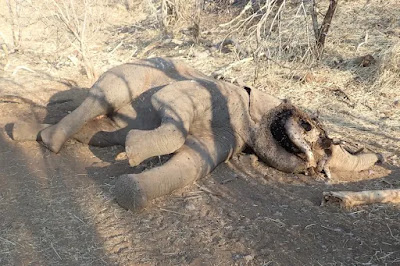 |
The cause of mysterious mass deaths of African elephants has finally been unraveled — and scientists who authored a new report say that the outbreaks could be more likely to occur amid conditions created by the ongoing climate crisis. Thirty-five African elephants in northwestern Zimbabwe dropped dead under baffling circumstances between late August and November 2020. Eleven of the massive herd animals died within a 24-hour period… Earlier that same year, about 350 elephants in neighboring northern Botswana also had died suddenly over the course of three months… It turns out a bacterial infection killed the elephants, according to the research based on samples taken from 15 of the animals that died in Zimbabwe… The deaths took place as food and water resources dwindled during the dry season, forcing the elephants to travel increasing distances to look for water and to forage… The authors said that heat, drought and population density in that area were likely contributing factors to the outbreak. And the extreme conditions that scientists project will occur with more frequency as Earth warms could mean more elephant deaths in the future. —CNN, November 6, 2023 |
shown to us by the elders:
in Zimbabwe we trekked lumbering our feet
across the arid dry ground, leaves and
twigs, fruits already eaten
by those hungry before us.
It is a fever that starts first as thirst,
no relief from flapping our ears back,
waving dry dust across each others’ backs,
we remember the waterholes our elders
brought us to in times of thirst—
they’ve been here before, but never so long as this.
We don’t forget, we hold all the memories
of the beauty of the running water,
the coolness in the shade, how
you loved each other, all of you—
don’t forget—the rumble of our feet
transmitting messages to each other as
we roam further apart, the sound
of jeeps from rescuers from other years
bringing banana leaves, but this time,
the water holes we remembered
had dried up, you walked too far away
for our message to reach you—turn back.